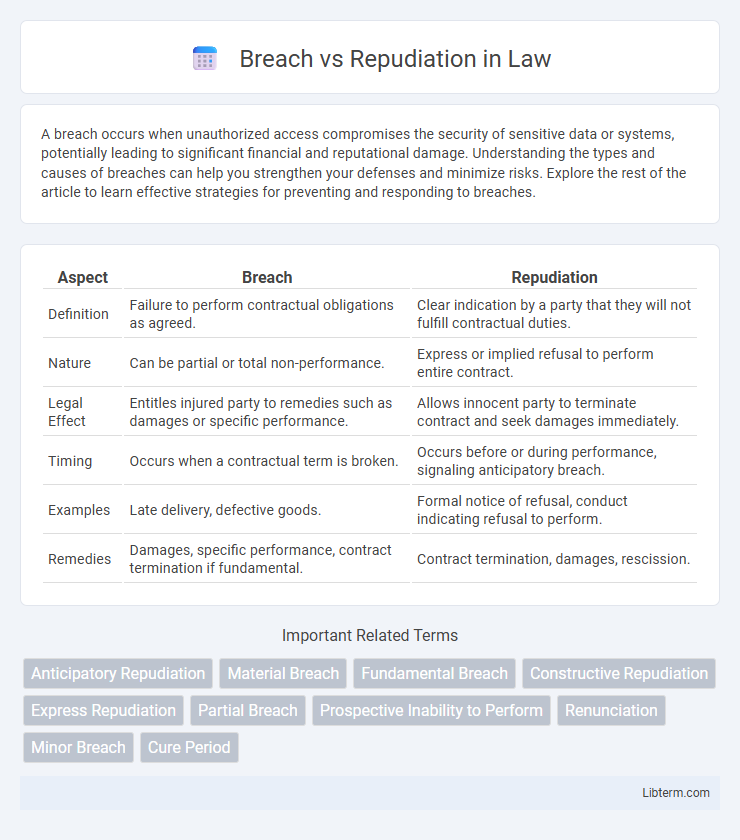A breach occurs when unauthorized access compromises the security of sensitive data or systems, potentially leading to significant financial and reputational damage. Understanding the types and causes of breaches can help you strengthen your defenses and minimize risks. Explore the rest of the article to learn effective strategies for preventing and responding to breaches.
Table of Comparison
| Aspect | Breach | Repudiation |
|---|---|---|
| Definition | Failure to perform contractual obligations as agreed. | Clear indication by a party that they will not fulfill contractual duties. |
| Nature | Can be partial or total non-performance. | Express or implied refusal to perform entire contract. |
| Legal Effect | Entitles injured party to remedies such as damages or specific performance. | Allows innocent party to terminate contract and seek damages immediately. |
| Timing | Occurs when a contractual term is broken. | Occurs before or during performance, signaling anticipatory breach. |
| Examples | Late delivery, defective goods. | Formal notice of refusal, conduct indicating refusal to perform. |
| Remedies | Damages, specific performance, contract termination if fundamental. | Contract termination, damages, rescission. |
Understanding Breach and Repudiation
Breach occurs when one party fails to fulfill contractual obligations, resulting in a violation of agreed terms. Repudiation refers to a party's clear indication, either by words or actions, that they will not perform their contractual duties. Understanding the distinction hinges on breach being an actual failure, while repudiation signals an intent to breach before performance is due.
Defining Breach of Contract
Breach of contract occurs when a party fails to perform any term of a contract without a legitimate legal excuse, resulting in a violation of the agreement's obligations. It may involve non-performance, incomplete performance, or substandard performance that undermines the contract's purpose. Unlike repudiation, which involves an outright refusal to fulfill contractual duties, breach can be partial or delayed but still significantly impacts contractual rights and remedies.
What Constitutes Repudiation?
Repudiation constitutes a party's outright denial or refusal to fulfill contractual obligations, signaling an intention not to perform as agreed. This breach can be explicit, through clear statements or actions, or implicit, inferred from conduct demonstrating an unwillingness or inability to comply. Legal recognition of repudiation allows the non-breaching party to terminate the contract and seek damages.
Key Differences Between Breach and Repudiation
Breach refers to the failure to perform contractual obligations as agreed, resulting in a violation of the contract terms. Repudiation occurs when one party indicates an intention not to fulfill their contractual duties, either explicitly or through conduct, amounting to a fundamental rejection of the contract. The key difference lies in breach being a non-performance or defective performance, while repudiation constitutes a clear refusal or inability to perform, allowing the innocent party to terminate the contract and claim damages.
Legal Consequences of Breach
A breach of contract results in legal consequences including damages awarded to the non-breaching party, specific performance, or contract rescission depending on jurisdiction and contract terms. Courts often assess compensatory damages to cover direct losses and consequential damages for related costs caused by the breach. In contrast, repudiation occurs when one party clearly indicates unwillingness to fulfill contractual obligations, allowing the other party to treat the contract as breached and seek immediate legal remedies.
Legal Consequences of Repudiation
Repudiation in contract law occurs when one party clearly indicates an intention not to fulfill contractual obligations, leading to immediate legal consequences such as the aggrieved party's right to terminate the contract and claim damages. Unlike a simple breach, repudiation allows the non-breaching party to treat the contract as discharged and seek remedies without waiting for actual performance failure. Courts often assess repudiation based on unequivocal evidence of intent to abandon the contract, emphasizing the importance of timely legal actions to mitigate losses.
Remedies Available for Breach and Repudiation
Remedies for breach of contract typically include damages, specific performance, or rescission, aiming to compensate the non-breaching party or enforce contractual obligations. Repudiation allows the innocent party to accept the repudiation, terminate the contract, and seek damages for anticipated losses. Both breach and repudiation remedies focus on restoring the injured party's position, but repudiation often provides immediate options to cease performance and claim compensation.
Examples of Breach vs Repudiation
Breach of contract occurs when one party fails to perform their obligations, such as a vendor missing a delivery deadline or providing substandard goods. Repudiation involves one party clearly indicating an intention not to fulfill the contract, exemplified by a contractor announcing refusal to complete a building project before the deadline. Courts treat breach as a failure to perform, while repudiation allows the non-breaching party to terminate the contract and seek damages immediately.
Factors Courts Consider in Determining Breach or Repudiation
Courts evaluate factors such as the severity and timing of the party's non-performance in determining breach or repudiation, focusing on whether the conduct indicates an intention to refuse or unable to perform contractual obligations. The distinction hinges on whether the breach is anticipatory, signaling clear refusal before performance is due, or a mere failure to perform on time without intent to repudiate. Courts also consider the contractual terms, the nature of the obligation, and the impact on the aggrieved party to assess whether the conduct justifies treating the contract as terminated or seeking damages.
Best Practices to Avoid Breach and Repudiation
Implementing robust contract management systems and maintaining clear, detailed documentation significantly reduce the risk of breach and repudiation in agreements. Regular communication and timely performance reviews ensure all parties adhere to terms, while utilizing electronic signatures and audit trails help verify commitment and prevent denial of obligations. Establishing dispute resolution mechanisms and educating stakeholders on contractual responsibilities further enhance compliance and minimize conflicts.
Breach Infographic

 libterm.com
libterm.com